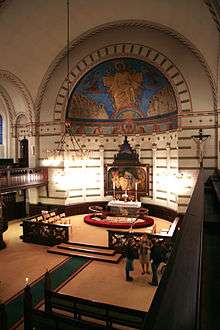Definify.com
Webster 1913 Edition
Quire
Quire
,Verb.
I.
To sing in concert.
[R.]
Shak.
Quire
(kwīr)
, Noun.
[OE.
quaer
, quair
, OF. quayer
, cayer
, caïer
, F. cahier
, a book of loose sheets, a quarter of a quire, LL. quaternus
, quaternum
, sheets of paper packed together, properly, four together, fr. L. quaterni
four each, by fours, quattuor
four. See Four
and cf. Cahier
.] A collection of twenty-four sheets of paper of the same size and quality, unfolded or having a single fold; one twentieth of a ream.
Webster 1828 Edition
Quire
QUIRE
,Noun.
1.
A body of singers; a chorus. [See Chorus and Choir.]2.
The part of a church where the service is sung.QUIRE
,Noun.
A collection of paper consisting of twenty four sheets, each having a single fold.
QUIRE
,Verb.
I.
Definition 2026
quire
quire
English
Noun
quire (plural quires)
- One-twentieth of a ream of paper; a collection of twenty-four or twenty-five sheets of paper of the same size and quality, unfolded or having a single fold.
- 1882, James Edwin Thorold Rogers, A History of Agriculture and Prices in England, Volume 4, p. 592:
- Under the year 1533 we are told that the ream contained twenty quires.
- 1929, Virginia Woolf, A Room of One’s Own, Penguin Books, paperback edition, page 71:
- […] and we must accept the fact that all those good novels, Villette, Emma, Wuthering Heights, Middlemarch, were written by women without more experience of life than could enter the house of a clergyman; written too in the common sitting-room of that respectable house and by women so poor that they could not afford to buy more than a few quires of paper at a time upon which to write Wuthering Heights or Jane Eyre.
- 2004, Jason Glenn, Politics and History in the Tenth Century: The Work and World of Richer of Reims, Cambridge: Cambridge University Press, ISBN 978-0-521-83487-2, page 140:
- We saw above that the fourth quire consists of ten folios, two of which (folios 29 and 31) Richer added to a quaternion (folios 23 to 28, 30, 32). Most of the folios Richer added to his manuscript supplement, elaborate, or amend text that he had already composed in the codex. In this quire, however, Richer wrote around the added folios as if it was the quire he added to them, not the converse. Indeed, if we were to remove folios 29 and 31, there would be neither grammatical nor narrative continuity between the original folios of the quire which would face each other, that is, between folios 28v[erso] and 30r[ecto] on the one hand, or folios 30v and 32r on the other.
- 1882, James Edwin Thorold Rogers, A History of Agriculture and Prices in England, Volume 4, p. 592:
- (bookbinding) A set of leaves which are stitched together, originally a set of four pieces of paper (eight leaves, sixteen pages). This is most often a single signature (i.e. group of four), but may be several nested signatures.
- A book, poem, or pamphlet.
Translations
one-twentieth of a ream
Coordinate terms
Verb
quire (third-person singular simple present quires, present participle quiring, simple past and past participle quired)
- (bookbinding) To prepare quires by stitching together leaves of paper.
- 1870, William White, Notes and Queries, vol. 42:
- Now, in the first folio volume of 1616, the paging, signatures, and quiring are continuous and regular throughout.
- 1938, The Dolphin: A Journal of the Making of the Books, issue 3:
- This is a natural point at which to ask why quiring went out of fashion.
- 1976, Alfred William Pollard, Alfred William Pollard: A Selection of his Essays:
- By means of these smooth pages we can mostly see how the modern binder made up the book, but whether in doing this he followed the original quiring is quite another matter.
- 1870, William White, Notes and Queries, vol. 42:
See also
-
 Units of paper quantity on Wikipedia.Wikipedia
Units of paper quantity on Wikipedia.Wikipedia
Etymology 2

A church quire
See choir.
Noun
quire (plural quires)
- (archaic) A choir.
- c.1590, William Shakespeare, Henry VI, part 2, I.iii:
- Madam, myself have lim'd a bush for her,
- And plac'd a quire of such enticing birds,
- That she will light to listen to the lays,
- And never mount to trouble you again.
- Bishop Joseph Hall
- Yea, and the prophet of the heav'nly lyre, / Great Solomon sings in the English quire […]
- c.1590, William Shakespeare, Henry VI, part 2, I.iii:
- One quarter of a cruciform church, or the architectural area of a church used by the choir, often near the apse.
Verb
quire (third-person singular simple present quires, present participle quiring, simple past and past participle quired)
- (intransitive) To sing in concert.
- c.1598, William Shakespeare, The Merchant of Venice, V.i:
- Sit, Jessica. Look how the floor of heaven / Is thick inlaid with patines of bright gold: / There's not the smallest orb which thou behold'st / But in his motion like an angel sings, / Still quiring to the young-eyed cherubins; / Such harmony is in immortal souls; / But whilst this muddy vesture of decay / Doth grossly close it in, we cannot hear it.
- 1938, William Faulkner, "Barn Burning"
- He went on down the hill, toward the dark woods within which the liquid silver voices of the birds called unceasing-the rapid and urgent beating of the urgent and quiring heart of the late spring night.
- c.1598, William Shakespeare, The Merchant of Venice, V.i: